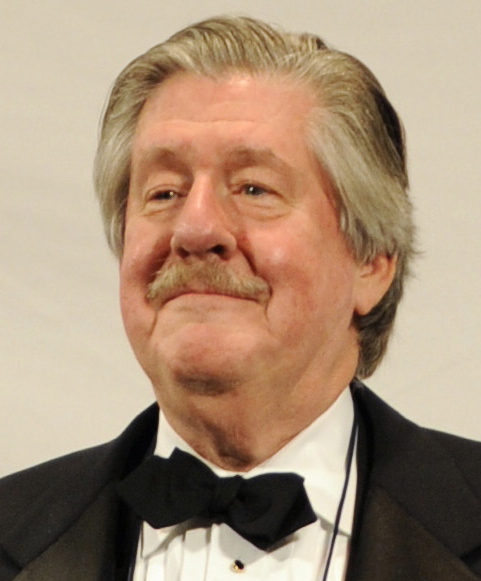Edward Herrmann, a Tony and Emmy Award-winning actor who became known for his memorable portrayals of President Franklin D. Roosevelt and, more recently, for his role as the father on the TV series “Gilmore Girls,” died Wednesday at a hospital in New York City. He was 71.
The cause was brain cancer, said his son, Rory Herrmann.
At 6-foot-5, and with a commanding, elegant voice, Herrmann was a charismatic presence during his decades-long career in the dramatic arts. To his early audiences, he was closely identified with the character of FDR, the president who overcame polio as a young man and led the United States through the Depression and much of World War II.
Roosevelt was portrayed by actor Ralph Bellamy in the film “Sunrise at Campobello” (1960) and more recently by Bill Murray in “Hyde Park on Hudson” (2012). But for viewers in the 1970s, Herrmann personified the role.
He played FDR in “Eleanor and Franklin,” a 1976 TV movie based on Joseph P. Lash’s Pulitzer Prize-winning book and co-starring Jane Alexander as Eleanor Roosevelt. The actors appeared together again in “Eleanor and Franklin: The White House Years,” a 1977 sequel.
“He was such a private man – even more private than Eleanor,” Herrmann said of FDR in a 1977 interview. “The role is really quite difficult. I have not tried to imitate him, but I can suggest him.”
Herrmann said he studied hundreds of hours of recordings of the president. A particular challenge, he said, was learning FDR’s gait before he contracted polio. The actor said he relied on 30 seconds of film from 1920 that showed Roosevelt stepping off a porch and shaking hands.
Herrmann played the president again in the 1982 film version of the musical “Annie,” directed by John Huston and featuring Aileen Quinn as the endearing orphan girl, Albert Finney as Oliver Warbucks and Carol Burnett as Miss Hannigan.
On the stage, Herrmann received a Tony Award for his performance in a 1976 production of George Bernard Shaw’s play “Mrs. Warren’s Profession” opposite Lynn Redgrave as the heroine Vivie Warren. He was nominated for a Tony for his 1983 role in David Hare’s play “Plenty” as a diplomat in postwar Europe.
On the screen, Herrmann’s early parts included a performance with Timothy Bottoms as a law student in “The Paper Chase” (1973) and as the freeloading Klipspringer in “The Great Gatsby” (1974), starring Robert Redford and Mia Farrow.
Later, his varied roles included a vampire in the horror movie “The Lost Boys” (1987); Richard Rich Sr. in “Richie Rich” (1994), with Macaulay Culkin; Nelson Rockefeller in “Nixon,” Oliver Stone’s 1995 film starring Anthony Hopkins; the newspaper publisher William Randolph Hearst in director Peter Bogdanovich’s “The Cat’s Meow” (2001); and the film censor Joseph Breen in “The Aviator” (2004), featuring Leonardo DiCaprio as Howard Hughes.
As a television actor, Herrmann received an Emmy Award in 1999 for his performance as Anderson Pearson on the legal drama “The Practice.” He also appeared in other series, including “St. Elsewhere,” “Oz,” “Grey’s Anatomy” and “How I Met Your Mother.”
On “Gilmore Girls,” which ran from 2000 to 2007 and starred Lauren Graham and Alexis Bledel, he played a father navigating his relationship with a daughter who becomes a single mother.
Edward Kirk Herrmann was born July 21, 1943, in Washington and grew up in Grosse Pointe, Michigan, where his father was an engineer in the automotive and rail industries. He received an English degree from Bucknell University in Lewisburg, Pennsylvania, in 1965 before studying at the London Academy of Music and Dramatic Art, where he cultivated a passion for British literature.
Herrmann’s first marriage, to actress Leigh Curran, ended in divorce. Survivors include his wife of two decades, Star Hayner Herrmann of Salisbury, Connecticut; three children from his second marriage, Rory Herrmann of Los Angeles, Ryen Herrmann of Washington and Emma Herrmann of New York City; a brother; and a granddaughter.
People turn to theater “to be enlightened and enriched,” Herrmann told the Boston Globe in 1990, explaining what he regarded as the power of acting.
“They don’t want to think about what’s on the stove, whether or not their children are on drugs or that they’re having affairs. Acting is intangible and illusive. But people come to the theater with the same attitude that I approach the stage. They, like me, are hoping for a connection.”
Send questions/comments to the editors.



Success. Please wait for the page to reload. If the page does not reload within 5 seconds, please refresh the page.
Enter your email and password to access comments.
Hi, to comment on stories you must . This profile is in addition to your subscription and website login.
Already have a commenting profile? .
Invalid username/password.
Please check your email to confirm and complete your registration.
Only subscribers are eligible to post comments. Please subscribe or login first for digital access. Here’s why.
Use the form below to reset your password. When you've submitted your account email, we will send an email with a reset code.